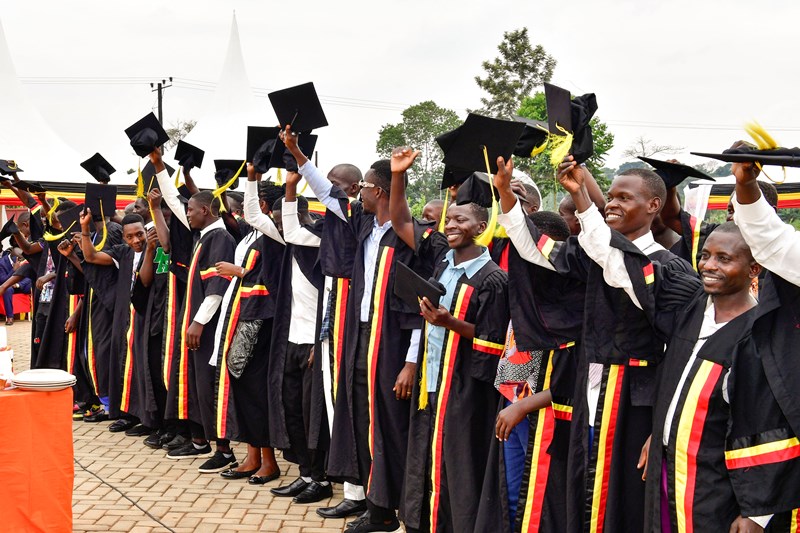More than 1,200 refugees and members of refugee-led businesses have graduated with internationally recognized digital skills certification under the Government of Uganda’s Digital Skilling for Refugees Programme, a multi-partner initiative aimed at bridging the digital divide in refugee-hosting communities.
The graduation ceremony, held at the National ICT Innovation Hub in Nakawa, marked the close of Phase Two of the programme, delivered by the Ministry of ICT and National Guidance through the Uganda Institute of Information and Communications Technology (UICT) in partnership with ICDL Africa, UNHCR, and Finn Church Aid.
Speaking at the event, Permanent Secretary Dr. Aminah Zawedde said the initiative was part of the government’s broader vision for a “digitally skilled Uganda” and directly addressed the challenge of economic self-reliance among refugees.
Latest
Over 3,000 Fake CHAN Tickets Seized at Namboole By Matchday 3
FDC Unveils Ambitious 2026–2031 Manifesto, Promising Governance Reform and Economic Transformation
Gen Muhoozi Fires Michael Katungi from PLU Over $58 Million US Arms Trafficking Case
CEC: The Strategic Brain and Ideological Compass of the NRM
Govt Releases Burial Programme, Mary Karooro Okurut, to Receive Official Send-Off
NUP Petitions Court Over UPDF Amendment Act, Cites Defiance of Supreme Court Ruling
Picking Presidential Nomination Papers: Aspirants Hit 114 On Day Three
35 Arrested in Katwe Crackdown on Boda Boda Theft Gangs
Museveni Officially Joins 2026 Presidential Race as Aspirants Hit Record 121
Uganda to Prioritise E-Waste Refurbishment in Fight Against Digital Pollution
Electrician Arrested Over Vandalism of Power Lines in Luweero
Pharmacy Students Petition Parliament Over ‘Illegal’ Pre-Internship Exams
51 Individuals Pick Nomination Forms to Become Uganda’s Next President–EC
“Training refugees alongside host communities is proof that our vision for a digitally skilled Uganda is becoming a reality,” Dr. Zawedde said. “We are not just imparting skills — we are creating pathways for livelihoods, self-reliance, and participation in the global digital economy.”
Programme impact
Phase Two, which ran from May to July 2025, attracted 1,003 applicants. Of these, 721 participants trained in-person and 331 online, with 85.9% earning ICDL certifications in modules such as Computer Essentials, Cybersecurity, Digital Marketing, Data Analytics, and Web Editing. The programme also:
- Upskilled 48 ICT teachers in refugee-hosting districts.
- Trained 137 refugee entrepreneurs in digital marketing.
- Increased female participation from 18% in Phase One to 32% in Phase Two.
- Provided training in Arabic and French to break language barriers.
Refugees from settlements such as Lobule, Kiryandongo, and Bidi Bidi were among the graduates, with some using their new skills to grow businesses and reconnect with family abroad.
Partners speak out
ICDL Africa General Manager, Ms. Solange Umulisa, hailed the collaboration as a model for inclusive digital transformation. “This is exactly the type of tangible impact we envisioned when signing the MoU with the Government of Uganda. Together, we are ensuring no community is left behind in the digital transformation,” she said.
The initiative stems from a January 2023 Memorandum of Understanding between the Ministry of ICT and ICDL Africa, which also commits to reskilling government workers, enhancing ICT education delivery, and setting national digital skills standards.
Beyond refugees: strengthening public sector communication
Alongside the refugee programme, the Ministry is rolling out structured digital training for communication officers in Ministries, Departments, and Agencies. Nearly 30 officers from key institutions, including the Ministries of Health, Defence, and Works & Transport, have been trained in online communication and marketing under the first phase held in May.
“This is part of our mission to professionalise government communication and build a digitally empowered public sector,” said Under Secretary Ms. Sophia Nantongo.
Looking ahead
Dr. Zawedde announced plans to expand training to five new districts by 2026, establish solar-powered ICT labs to serve remote areas, and link graduates to global job markets — starting with the Remote Work Expo scheduled for September 2025.
“To our graduates: you are now ambassadors of digital transformation. Use your skills to uplift your communities, inspire others, and shape the future,” she said.
The event closed with personal testimonies, including that of a Koboko graduate who declared: “With this certificate, I am no longer just a refugee; I am a web designer.”





